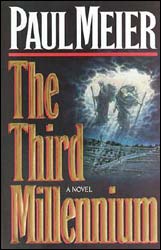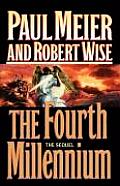Learning From Bad Books, Part 2
When I grow up, get old, and very likely die, and go to Heaven, I anticipate at least three things:
- Finally getting to see the face of Jesus.
- Reunions with Biblical saints, other faith heroes, perhaps household pets, etc.
- Novels will surely be published based on their inherent virtue, not Big Christian Names.
No. 3 is an issue of what Christian theologians (and writers who want to use theology terms) call adiaphora. Unlike, say, plagiarism or claiming to write a book you haven’t, it’s not sinful for a Big-Name Christian to try his hand at writing novels, and have an advantage over others because he has a Big Name.
Yet I wonder if it’s wise. And perhaps it’s even a violation of the Bible’s direct and implied teachings on spiritual gifts and God-glorifying vocations.
Paul wrote that the eye shouldn’t say to the hand, “I have no need of you” (1 Cor. 12). But what happens when the eye (say, a famous pastor or nonfiction author) instead says to the hand (in this case, a novelist), “Hey — I want your job”? And what does Scripture tell us about Christians who have different gifts and callings — are some of these more “spiritual” than others?
Big name on cover
 Last week I wrote about likely the worst published Christian novel I ever read. I don’t want to pick on the author, but it’s called The Third Millennium (must — resist — nasty pun). And not only did I read this work, but its two sequels — intentionally? Why? For a learning exercise.
Last week I wrote about likely the worst published Christian novel I ever read. I don’t want to pick on the author, but it’s called The Third Millennium (must — resist — nasty pun). And not only did I read this work, but its two sequels — intentionally? Why? For a learning exercise.
And one of the lessons I’ve learned is this: in a perfect world, only real novelists would publish novels. If they won’t let a mere researcher of medical thrillers head into the emergency room, don a clean white coat, pick up sharp objects and start a surgery, why let people who are clearly without writing gifts operate fiction’s heavy machinery, just because they have Big Names?
Of course, this isn’t a perfect world. Also, this celebrity-driven culture is just as common outside Christianity as within it. Yet if we truly believe God has given people different kinds of spiritual gifts, shouldn’t the ministers encourage novelists, and shouldn’t novelists encourage ministers?
The Third Millennium was written by a guy who had little fiction-writing training. I don’t know the story behind its path to publication (believe me, I’ve tried to find it). But I do know this:
The author is a psychiatrist, which is stated in the ending Appendix and “About the Author”, but those are unneeded for information of the author’s profession because of the multiple psychiatric “rabbit trails” that are woven into the story, often departing completely from the main intent of the novel. When planning the rooms in your office, it is best to match paint and wallpaper decor for specific patient needs; for example, rooms for examining hyperactive people would be painted in darker-toned colors such as gray or dark blue, whereas depressed patients should be treated in rooms with upbeat colors, such as yellow.
(From my 2002 review of The Third Millennium)
 Another glaring example is from the sequel, which tries to portray a literal Millennial Kingdom.
Another glaring example is from the sequel, which tries to portray a literal Millennial Kingdom.
[T]here seems to be no real motivation behind the antagonist world rulers—many of whom, oddly enough, carry the names of their countries’ latter-20th century heads of state. They are simply determined to cause plagues and pestilences and have sheer fun by making a war and breaking things.
But, on one occasion are we given a motivation behind the anarchistic goals of the Egyptian monarch, and the explanation is, to put it bluntly, a riot. [The author] provides the king’s excuse as: struggling with dyslexia and peer abuse as a youth.
(From my 2003 review of The Fourth Millennium)
The ‘bench of bishops’ should not write novels
But as many Christian readers know, it gets worse than trying to find ways to cram in references to your area of expertise (compromise with secular behavior theories notwithstanding). Many of the novels that tarnish all Christian fiction, by making stories mainly means to Life Lessons, come from authors whose true gifts just might lie in more-direct Gospel proclamation.
A Christian novelist is tasked with spreading the Gospel as much as anyone. But his platform and method is different from that of a minister. Thus a novelist might avoid (at times) giving the equivalent of a call to repentance in every single book. Is he compromising the Gospel? Not necessarily. Is he failing to be a witness for Christ? No. He’s merely following the rules of his vocation — just as a Christian politician may not give John 3:16 at the end of every speech.
Speaking of politics, C.S. Lewis had some great things to say about the different practices of Christians who are in different callings: be it clergyman, politician, or playwright or novelist.
People say, ‘The Church ought to give us a lead.’ That is true if they mean it in the right way, but false if they mean it in the wrong way. By the Church they ought to mean the whole body of practicing Christians.
[Lewis goes on to say that many believe, or imply, that Christians should help the world by pushing for specific economic or political improvements — wrong, in Lewis’s view.]
The clergy are those particular people within the whole Church who have been specially trained and set aside to look after what concerns us as creatures who are going to live for ever: and we are asking them to do a quite different job for which they have not been trained. The job is really on us, on the laymen. The application of Christian principles, say, to trade unionism or education, must come from Christian trade unionists and Christian schoolmasters; just as Christian literature comes from Christian novelists and dramatists—not from the bench of bishops getting together and trying to write plays and novels in their spare time.
— from Mere Christianity, C.S. Lewis (emphasis added)
Vocations in view
My case doesn’t just rest on what Lewis wrote, of course. Rather it’s based on what I’ve come to believe is rampant confusion in Christendom about what vocation is. Buried in the back of our minds tends to be the assumption that if your job is not overt Ministry, it’s not very spiritual.
But that isn’t just contrary to theologians who through the ages have written about glorifying God in all of life (by which the Puritans in effect built this civilization). It’s contrary to Scripture.
Slaves [equivalent to employees], obey in everything those who are your earthly masters, not by way of eye-service, as people-pleasers, but with sincerity of heart, fearing the Lord. Whatever you do, work heartily, as for the Lord and not for men, knowing that from the Lord you will receive the inheritance as your reward. You are serving the Lord Christ. (Colossians 3: 22-24)
And in the previously mentioned 1 Corinthians passage, Paul is clear about different gifts. These do not compromise our unity in Christ — they express it, through diversity of tasks and callings.
So in a perfect world, what would happen if someone from the “bench of bishops” thinks he’d like to try his hand at something like Christian fiction? Well, he wouldn’t have a leg up just because he’s made his Big Name at another vocation. Like any other first-timer, he’d have to demonstrate that he can write a story worth telling. Editors would take into account the author’s existing platform, but not only that. And they would also be caring and honest enough to say, “Doctor, all this psychiatry stuff has nothing to do with the story.”
Someday that perfect world will come: the New Heavens and New Earth. And nothing in the Bible presents the idea that “you can’t take it with you”; in fact, multiple passages support the idea that our good works, devoted to God, will follow us into eternity. Why wouldn’t the best novels and nonfiction of God’s people also be there? Surely we’ll also be able to write more.
And while I’m writing more, I hope to catch up to two Biblical heroes in particular — some of the heroes who don’t have their own Sunday school lessons, but whom God used so powerfully:
The Lord said to Moses, “See, I have called by name Bezalel the son of Uri, son of Hur, of the tribe of Judah, and I have filled him with the Spirit of God, with ability and intelligence, with knowledge and all craftsmanship, to devise artistic designs, to work in gold, silver, and bronze, in cutting stones for setting, and in carving wood, to work in every craft. And behold, I have appointed with him Oholiab, the son of Ahisamach, of the tribe of Dan. And I have given to all able men ability, that they may make all that I have commanded you […]” (Exodus 31: 1-6)
God’s first artists and craftsmen. The first man of whom He said, “I have filled him with the Spirit of God.” And those who had unique callings — not a big name, but still an essential role in Israel’s heritage. That’s an encouraging thought to “small” names today.
(Next week: How we can learn to never, never info-dump the way that bad books do.)











































[…] Art: Painting Inside The Lines From time to time I read comments or blog posts alluding to the skilled craftsmen God commissioned to build the tabernacle and all its accouterments (see for example Stephen Burnett’s article today at Speculative Faith). […]
Max Weber observed in his book, *The Protestant Ethic and the Spirit of Capitalism*, how the Puritan idea of Vocation has helped lead to the prosperity of the West and the US in particular. Great piece. I really enjoyed it. 🙂
Hi Stephen,
Very interesting article. I have to admit I’ve never given much thought to the issue but it makes perfect sense. A writer should prove that they can write well before they’re published and someone with a big name shouldn’t be elevated above other writers and published, just because they’re well-known. Each Christian has their role in God’s Kingdom, in being a part of God’s Body. We need to do our best with what God has given us and let other people do their best too. It’s easy to see how pride can fester so easily in our hearts when we don’t think inline with God and his Kingdom. Thanks for sharing this encouraging, humbling and thought-provoking piece.
Christian
Lewis had it right. Some are gifted with writing. Among those, some are gifted at fiction. What the writer must do is to be true to the faith in Christ and it will come through in the story, all the better if it is not a sermon, but rather is a subtext. If the writer is truly Christian, the book will be Christian.
Please visit my blog and leave a comment. Thanks!
[…] even sillier, another divergent, propagandistic scene shows a psychiatrist (hey! like the author, it turns out) feeding humanism slogans to a patient, such as “listen to your […]
[…] Part 2: Maybe Christians with different callings shouldn’t insist on writing novels. […]